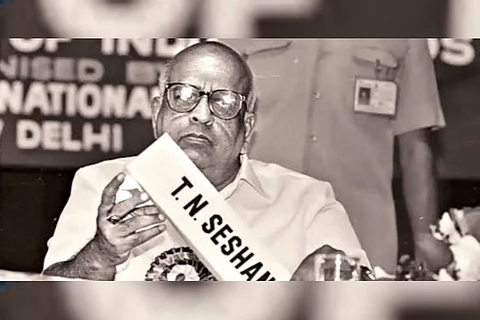

The man whose name will forever be synonymous with electoral reforms in India, TN Seshan, passed away on Sunday. At the age of 86, Seshan passed away at his residence in Chennai.
Born as Tirunellai Narayana Iyer Seshan on December 15, 1932 in Thirunellai, Palakkad district, Kerala, TN Seshan was widely known and remembered for his electoral reforms. He was the Chief Election Commissioner of India from 1990 to 1996 and played a major role in drastically ending electoral malpractices in the country.
A 1955-batch IAS officer, he served in various capacities before he was appointed as Secretary of Defence in 1988 when Rajiv Gandhi was Prime Minister. Thereafter, he was promoted to cabinet secretary, the highest position a civil servant can get, a year later in 1989. However, when VP Singh came to power, Seshan was sent to the Planning Commission.
Image: Wikimedia Commons
TN Seshan was appointed the 10th Chief Election Commissioner by President Venkataraman in December 1990. In the next six years, he changed the face of the Commission. While elections in India were all about money and muscle power, the Commissioners before him could not ensure that the Model Code of Conduct was adhered to. It was Seshan who brought in the change, demolishing walls of resistance.
Seshan went ahead and appointed special election observers in all states. These observers would watch the election process and 'check for incendiary campaign speeches, voter intimidation, vote-stealing and other tactics often associated with electoral violence'.
Seshan also clamped down on election spendings ensuring that the extravaganza that Indian elections has become was curtailed to a large extent.
His ironclad instructions prohibited bribing, intimidation and liquor distribution. Though they were multiple rules in place, it took Seshan's sternness to insist that elections cannot be communalised.
In the year 1994, as the Election Commissioner, he asked then Prime Minister to remove two of his sitting Cabinet ministers, then Welfare Minister Sitaram Kesari and Food Minister Kalpnath Rai, stating that they were involved in influencing voters and violating the model code of conduct that was in place ahead of the elections. He had told India Today in an interview that the ministers had made a deliberate attempt to influence voters and that the “Executive cannot use its powers to influence voters like this.”
Even then, despite facing criticism from political circles over what they called was an 'interference' in the workings of the government, he remained unfazed.
In the year 1996, Seshan was awarded the Ramon Magsaysay award for “his resolute actions to bring order, fairness, and integrity to elections in India, the world’s largest democracy. In asserting the authority and independence of the Election Commission, Seshan locked horns with India’s Supreme Court and has feuded bitterly with the country’s politicians, leading to more than one attempt to impeach him."
In 1997, a year after he retired as CEC, he contested to be the President of India and lost to KR Narayanan.
In 2018, while hearing a plea ahead of the Madhya Pradesh Assembly elections on bogus voters, the Supreme Court remembered the former Election Commissioner, saying that the credibility that the Election Commission had gained when it was headed by TN Seshan should be seen in the conduct of the upcoming polls.